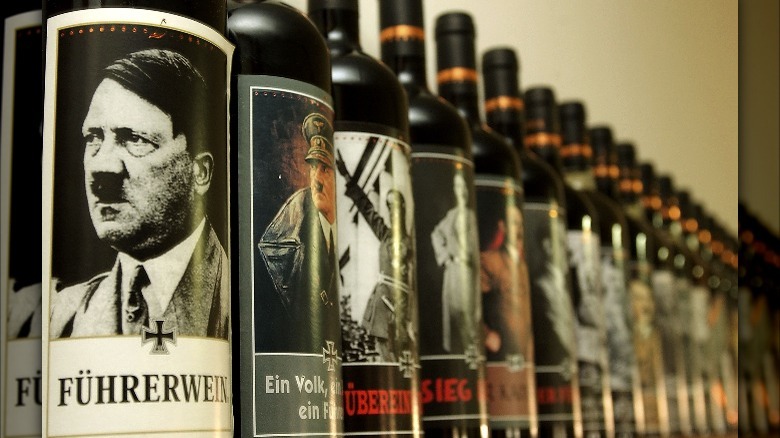The Italian 'Hitler Wine' Controversy, Explained
In the past couple of years, several brands have reevaluated their packaging and mascots because they either perpetuated racist stereotypes or were culturally insensitive. One food mascot that you will not see anymore is Aunt Jemima. In 2021, PepsiCo announced in a press release that Aunt Jemima syrup would be rebranded as Pearl Milling Company because the former logo was compared to a racist caricature known as "mammy" who, according to Ferris State University, "was posited as proof that [Black people] – in this case, [B]lack women – were contented, even happy, as slaves."
In 2020, Land O'Lakes announced that it was changing its logo in the leadup to its 100th anniversary to "reflect the foundation and heart of our company culture." But as Insider points out, the brand also received criticism for featuring a Native American woman as its logo, which some people associated with negative stereotypes and the abuse of Native American women. These companies that were called out for their controversial logos made changes, but one winemaker in Italy is protective of its controversial "historical" line of wines, which feature dictators like Adolf Hitler and Josef Stalin (via Vice).
The German government first filed official complaints in 1997
A winery in Northeastern Italy, Vini Lunardelli, has sold its "historical" line of wines since 1993, but the line became more controversial in 1995 when it debuted the Führer vintage, featuring Adolf Hitler on the bottle (per The Atlantic). Andrea Lunardelli, marketing and distribution director at the winery, told Decanter that customers from Austria and Germany specifically requested this series. However, the German government, which has banned "Mein Kampf" and outlawed neo-Nazi parties, filed official complaints about the wine in 1997. In 2007, Italian police confiscated bottles of the wine, but one month later, a judge declared it was not illegal for Vini Lunardelli to sell it.
The winemaker continued to skate by throughout the years, despite protests from several groups. In 2013, The Simon Wiesenthal Centre, which "combats antisemitism and protects human rights globally," led a boycott of the wine (via The Jewish Chronicle). In 2017, it seemed like the wine was finally going to be outlawed when a draft law "to criminalize the propagation of images or contents of the Fascist, Nazi or related anti-democratic parties and ideologies" passed in the Italian Parliament's lower chamber. However, the legislature did not make it past the Senate, so the wine remained on shelves. This year, Andrea Lunardelli, who described himself as "absolutely not a Nazi," told Vice that the line will be discontinued in 2023 when he takes over the winery due to the controversy.

